Select Works of John Dewey (11 vols.)
Digital Logos Edition
Overview
Along with Charles Sanders Peirce and William James, John Dewey is considered one of the central figures in American pragmatism. A philosophical tradition that continues to hold sway today, pragmatism identifies the usefulness and practical effect of belief as the proper focus of philosophy. Dewey initially considered himself a Hegelian, but later turned toward pragmatism as a result of James’ Principles of Psychology. The scope of Dewey’s interests, however, reflect Hegel’s influence. Dewey not only wrote about traditional philosophical subjects, but addressed topics such as art, education, culture, politics, and civil society. As a pragmatist, he considered these subjects under his rubric of “reconstruction,” the conviction that pragmatism represents a means of systematically reorienting philosophy from the “problems of philosophers” to “the problems of men.”
The Select Works of John Dewey includes works from Dewey’s early and middle periods, and reflects his transition from Hegelian idealism to pragmatism. Each volume is indexed, enabling you to search for a word or phrase with a click. You can use the dictionary lookup tool to define difficult concepts or phrases in the key texts that initiated Dewey’s career and legacy. These texts are integrated with the rest of your library, allowing for simple cross-referencing and side-by-side comparison.

Key Features
- Seminal works from Dewey’s early and middle writings
- Comprehensive indexes
- Illustrations
Product Details
- Title: Select Works of John Dewey
- Author: John Dewey
- Volumes: 11
- Pages: 3,018
Individual Titles

Originally published in 1886, Psychology is a textbook that uses psychology to introduce students to philosophy. Observing that “It is the custom of our colleges to make psychology the path by which to enter the fields of philosophy,” Dewey draws from the research of the “new psychology,” with its emphasis on experimentation rather than introspection, to illustrate philosophical concepts. Psychology reflects Dewey’s early commitment to Hegelian idealism and his effort to merge philosophical reflection with the application of scientific method, the latter of which endured in his writings as a pragmatist. The Logos edition presents the third edition of Psychology (1891) which includes revisions in keeping with the emerging psychological research of Dewey’s day.

Originally commissioned for the German Philosophical Classics for English Readers and Students series, Dewey’s Leibniz’s New Essays Concerning the Human Understanding examines the merits of G. W. Leibniz’s philosophical views in contrast to British empiricism. Dewey highlights Leibniz’s critique of John Locke, praising Leibniz as embodying the “dawning consciousness of the modern world.” Yet, he criticizes Leibniz’s for failing to reconcile his formal logic with the exercise of everyday thought. Like Psychology, Leibniz’s New Essays Concerning the Human Understanding reflects Dewey’s early commitment to Hegelian idealism, yet anticipates the examination of the process of inquiry that will figure centrally in his future works.
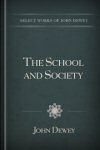
First published in 1889, The School and Society reflects Dewey’s developing interest in the philosophy of education and society. Dewey argues that changes in American industry, technology, and science have created unique challenges and contexts for education. Recognizing that an intimate relationship exists between education and the creation and maintenance of society, Dewey maintains that schools and education should be oriented by the practical concerns of society. The Logos edition presents the second revised edition of The School and Society (1915).
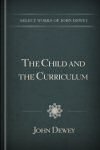
In The Child and the Curriculum, Dewey provides reflections on education, curriculum, and the development of learning in children. Like The School and Society, The Child and the Curriculum centers on how education can be offered in a manner that benefits society. Dewey considers the psychology of learning in children to explore best practices for curriculum development. He argues that curriculum must facilitate opportunities for children to engage, experience, and connect information.
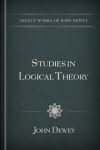
A collection of essays, Studies in Logical Theory features the work of Dewey and his associates at the University of Chicago regarding the process of human inquiry. Four of the eleven essays were written by Dewey and serve as a precursor to his fuller exploration of this process in How We Think. The essays collectively argue that the act of knowledge cannot be treated “as a self-inclosed and self-explanatory whole”; rather, a theory of the process of inquiry must include a theory of knowledge informed by the domains of experience and practice. Key concepts in Dewey’s philosophy emerge in these essays, including the “problematic situation” and the notion of fallibilism—the idea that anything accepted as knowledge possesses this status in virtue of its providing a coherent view of the world and a reliable basis for human action.
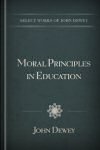
In Moral Principles in Education, Dewey continues to advance his project of education and social reform. Stating that children must be educated in accordance with the principles of society at large, Dewey explores how education can best prepare students to participate in democratic society. As such, this work anticipates Dewey’s influential Democracy and Education.
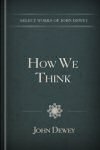
In How We Think, Dewey takes up the task of defining what it means to think reflectively with the practical aim of providing a manual for educators. Dewey offers a philosophical characterization of “reflection” or critical thinking, arguing that reflection is not an end unto itself, but a tool by which humans transform raw experience into meaningful understanding. He maintains that the proper application of reflection contributes to the moral development of individuals and society. As such, Dewey’s work represents a pragmatist analysis of the theory of knowledge.
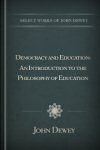
Dewey believed that democracy represents the social condition most amenable to human advancement. In Democracy and Education, Dewey applies this thesis to education, maintaining that democracy is more than a mode of governance—it is a set of practices communities collectively engage in marked by cooperation and innovation. Dewey argues that these practices should be developed in citizens while they are children, and that educational institutions should consider themselves as integral to this development.

In Essays in Experimental Logic, Dewey continues an examination begun in Studies in Logical Theory. Here, he applies the principles of instrumentalism to logical theory in an effort to situate logic within the framework of pragmatism. Essays points to an exploration that comes to fruition in Logic: The Theory of Inquiry (1938) where Dewey reorients logic by locating it within the context of the process of human inquiry.
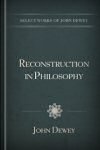
Reconstruction in Philosophy represents Dewey’s most programmatic application of pragmatic method to philosophy. He argues that philosophy itself must undergo “reconstruction,” one that no longer privileges metaphysics at the expense of an account of human flourishing. In place of the pursuit of absolutes and certainty sought by metaphysicians, Dewey proposes a “reconstructed” philosophy that focuses on human experience and the intelligent use of the thoughts and actions that comprise this process. The Logos edition presents the first edition of this work.
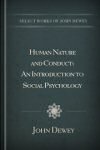
Human Nature and Conduct presents an ethical theory through the lens of social psychology. Dewey begins with a description of human nature based on the insights of social psychology. From this, he puts forward a theory of ethics that emphasizes the role of habit and its relationship to the development of character. He also emphasizes the role of critical, reflective thinking in guiding and revising habitual behavior, yielding a distinctly Aristotelian analysis.
This title is included in the following collections
You can save when you purchase this product as part of a collection.
Modern Philosophy Research Lib...
$499.99$499.99Philosophy Research Library (1...
$799.99$799.99Verbum 7 Portfolio Legacy Libr...
$4,749.99$4,749.99
About John Dewey
John Dewey (1859–1952) was born in Burlington, Vermont. He studied philosophy at the University of Vermont and worked as a primary and secondary school teacher after graduation. After receiving private instruction in philosophy from a former professor, Henry A. P. Torrey, Dewey decided to pursue a career in philosophy, enrolling in doctoral studies at Johns Hopkins University. There he studied under Charles Sanders Peirce, receiving his doctorate in 1884. Dewey taught at the University of Michigan (1884–1894), University of Chicago (1894–1904), and University of Columbia from 1904 until his retirement in 1930. While teaching at the University of Chicago, Dewey’s thought became distinctly pragmatist in orientation. During his appointment at the University of Columbia, he embraced the role of public intellectual and social commentator, writing in magazines like The New Republic and engaging in political activism. He was elected president of the American Psychological Association in 1899, and president of the American Philosophical Association in 1905. He died in 1952 at the age of ninety-two.